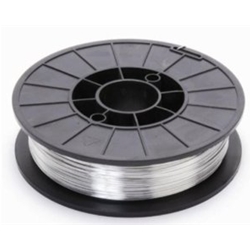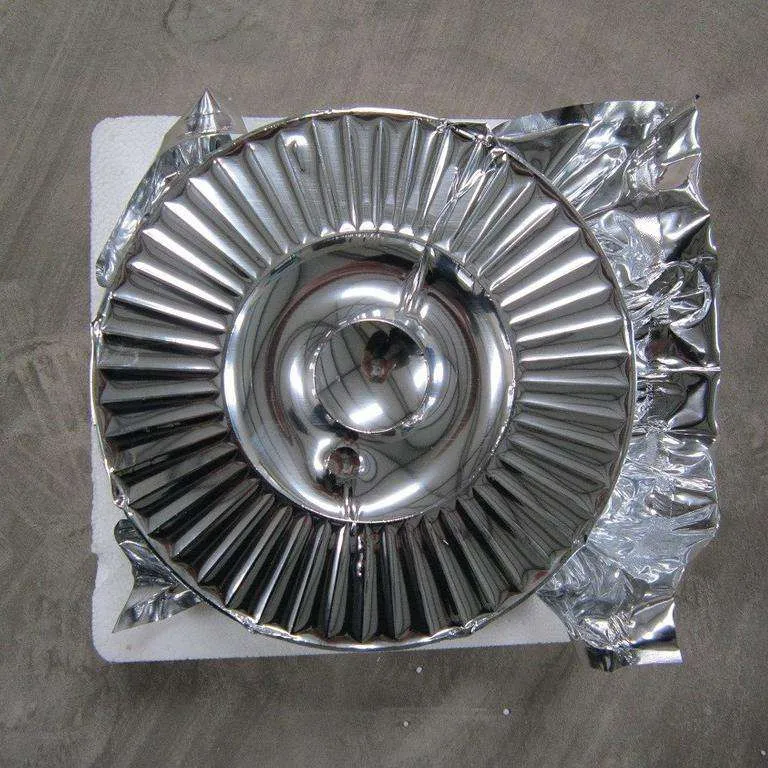Flux-Cored Wire versus Solid Wire
Flux-Cored Wire versus Solid Wire
 What are the differences between flux-cored electrode wire and solid electrode wire? Is one type of electrode better than the other for welding? What are the advantages and disadvantages of each type of wire?
What are the differences between flux-cored electrode wire and solid electrode wire? Is one type of electrode better than the other for welding? What are the advantages and disadvantages of each type of wire?
Flux-Cored Wire Electrodes
There are two types of flux-cored wire electrodes: gas-shielded and self-shielded. As its name implies, the gas-shielded type of flux-cored wire requires an external shielding gas. The self-shielded variety does not.
The flux coating on gas shielded flux-cored wires solidifies faster than the molten weld material. Consequently, a sort of shelf is created which holds the molten pool when welding overhead or vertically up. Gas-shielded flux wires work well when welding thicker metals. They also work well for welding out-of-position applications. Slag removal is easy with this type of wire.
Self-shielding flux-cored wires do not require an external shielding gas. With this type of electrode, the weld pool is protected as gas is generated when the flux from the wire is burned. Because the self-shielding wire produces its own protective shield and doesn’t require an external gas tank, it is more easily carried about.
Advantages of Flux-Cored Wire Electrodes
There are several advantages of using flux-cored wire electrodes. These advantages include but are not limited to:
- They allow for a high deposition rate.
- They work well outdoors and in windy conditions.
- With the right filler materials, these electrodes can make FCAW an “all-position” process.
- Typically, flux-cored wires create clean, strong welds.
-
TUBULAR WELDING WIRE FLUX CORED MIG WIRE

Disadvantages of Flux-Cored Wire Electrodes
There are concerns with any type of welding method. Regardless of the process and type of electrode used, there is the possibility of creating an incomplete fusion between the base metals. Slag inclusion or cracks in the welds may also result.
Additional problems that may arise when using flux-cored electrode wires include:
- A melted contact tip may occur if the electrode contacts the base metal and fuses the two together.
- If gases do not escape the welded area before the metal hardens, the weld may develop holes and become porous.
Solid Wire Electrodes
Solid wire electrodes are used in Metal Inert Gas Welding. Such electrodes require a shielding gas, which is delivered from a pressurized gas bottle. The shielding gas protects the molten weld pool from atmospheric contaminants.
Solid wire electrodes are often made of mild steel which is plated with copper to prevent oxidation and to aid in electrical conductivity. The copper plating also helps to increase the life of the welding contact tip.
Solid wires are the best choice when working on thin materials, such as sheet metal. They should produce nice, clean welds.
Solid wire electrodes do not work well in wind. Exposing the shielding gas to the wind can compromise the integrity of the weld.
Which Wire is the Best Choice?
When comparing the flux-cored wires to the solid wires, it would be wise to note that the best choice is dependent upon the welding job and location. Both types of wires can produce sound welds with good weld bead appearances, when done correctly.
For thicker metals and outdoor jobs, the flux-cored wire electrodes work best. For thinner metals and jobs performed out of the wind, solid wire electrodes can work quite well.
Solid wire electrodes used in MIG welding are not as portable as flux-cored wires. This is due to the necessity of a shielding gas in MIGW.
Both solid wire electrodes and flux-cored wire electrodes are relatively easy to use. However, flux-cored wire electrodes are more costly.
-
E316L Welding Rod: Premium 316L Stainless Steel WeldsNewsAug.11,2025
-
Premium SG2 Welding Wire | High-Quality MIG/MAG for SteelNewsAug.10,2025
-
E309 Welding Electrode: Premium Stainless Steel Stick RodsNewsAug.09,2025
-
Premium Solid MIG Wire for Strong, Reliable WeldsNewsAug.08,2025
-
E6010 Cellulose Electrode: Deep Penetration Steel Welding RodNewsAug.07,2025
-
Premium E316L Welding Rod for 316L Stainless SteelNewsAug.06,2025


